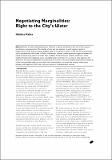| dc.contributor.author | Mehta, Nishtha | en |
| dc.date.accessioned | 2016-01-06T16:53:28Z | |
| dc.date.available | 2016-01-06T16:53:28Z | |
| dc.date.issued | 2012 | en |
| dc.identifier.citation | Mehta, N. (2012) Negotiating Marginalities: Right to the City's Water. IDS Bulletin 43(2): 79-85 | en |
| dc.identifier.issn | 1759-5436 | en |
| dc.identifier.uri | https://opendocs.ids.ac.uk/opendocs/handle/20.500.12413/7473 | |
| dc.description.abstract | Failure of water?related planning in Delhi can in part be attributed to the lack of inter?agency coordination and cooperation. This inability of state and city agencies to work together results in fragmentation of the state, and places potable water at the centre of politics in the city. This fragmentation and its consequences can be seen in Delhi's resettlement colonies, where government agencies attempt to create formal housing options for urban poor residents, formerly living in squatter settlements. These neighbourhoods have inadequate access to potable water and limited or no access to state agencies. This absence of the state in resettlement colonies renders the role of non?governmental organisations (NGOs) as critical. Using potable water as the analytic, this article attempts to unpack the complex relationships between state agencies, NGOs and urban poor residents of resettlement colonies. | en |
| dc.format.extent | 7 | en |
| dc.publisher | Blackwell Publishing Ltd | en |
| dc.relation.ispartofseries | IDS Bulletin Vol. 43 Nos. 2 | en |
| dc.rights.uri | http://www.ids.ac.uk/files/dmfile/IDSOpenDocsStandardTermsOfUse.pdf | en |
| dc.title | Negotiating Marginalities: Right to the City's Water | en |
| dc.type | Article | en |
| dc.rights.holder | © 2012 The Author. IDS Bulletin © 2012 Institute of Development Studies | en |
| dc.identifier.doi | 10.1111/j.1759-5436.2012.00310.x | en |

